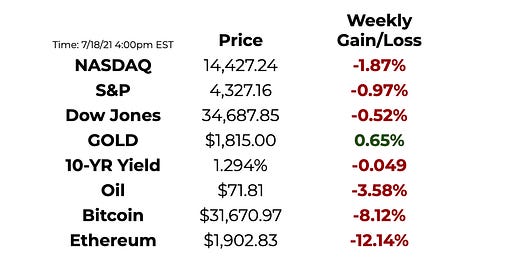Myth Of Money: SEC vs. Ripple
Welcome to this week’s edition of the Myth of Money, a weekly newsletter on all things money, economics and technology read by 10,000+ investors, curated by Tatiana Koffman.
Disclaimer: The following is not intended as investment advice. Do your own research.
Dear Investors,
As crypto markets continue to move sideways, the big story this week is the Ripple SEC hearings.
What Is Ripple?
According to Investopedia:
Ripple is a technology that acts as both a cryptocurrency and a digital payment network for financial transactions. It was first released in 2012; it was co-founded by Chris Larsen and Jed McCaleb. Ripple's main process is a payment settlement asset exchange and remittance system, similar to the SWIFT system for international money and security transfers, which is used by banks and financial middlemen dealing across currencies.
In December 2021, the Securities and Exchange Commission sued Ripple, its founder Chris Larsen, and CEO Brad Garlinghouse, accusing the company of raising $1.3 billion in unregistered digital-asset securities. The crux of the SEC complaint is that XRP is not a currency, but a security, and therefore subject to strict securities laws.
SEC stated that Ripple "failed to register their ongoing offer and sale of billions of XRP to retail investors, which deprived potential purchasers of adequate disclosures about XRP and Ripple's business and other important long-standing protections that are fundamental to our robust public market system.”
The lawsuit rocked Ripple. The value of XRP dropped dramatically. Coinbase and other major exchanges suspended XRP trading.
One of Ripple’s defences is that “the SEC failed to give fair notice to market participants about which digital assets they would consider to be what's called investment contracts under the law or, stated even more precisely, how they would go about determining which digital assets would be investment contracts under the law.” Ripple further alleges that SEC created mass confusion in the marketplace.
According to Bloomberg:
To strengthen its case, Ripple had asked a U.S. magistrate judge to let it depose William H. Hinman, the former director of the SEC’s Division of Corporation Finance, seeking testimony on the process the agency uses to arrive at policy decisions. The aim was partly to determine whether a June 2018 speech Hinman gave saying that Bitcoin and Ether aren’t securities can be used to show the commission’s adopted position, and to develop evidence on whether market participants viewed XRP as a security.
The SEC fought the subpoena, saying the questioning “would subject high-level government officials to depositions regarding every law, regulation, or policy they consulted on or spoke about and that later underlay an enforcement action.” It warned that would “disrupt the functioning of government agencies by discouraging qualified people from public service given the near certainty that their tenures would ensnare them in litigation.”
After a hearing on Thursday, Hinman was ordered to sit for a deposition, with the ruling judge stating that as a “high-ranking official” who led one of the six divisions of the SEC, he held “substantial authority in a very important federal agency.”
This substantial win for Ripple could lead to a positive turn in the case as a whole, with speculators already taking XRP trading positions. Stay tuned.
This Week By the Numbers 📈
Top Stories 🗞
SEC Further Delays WisdomTree Bitcoin ETF Decision
The U.S. Securities and Exchange Commission (SEC) pushed a decision on WisdomTree’s bitcoin exchange-traded fund (ETF) application to the autumn. In a Tuesday order launching proceedings on whether or not the agency should approve the application, the SEC asked for feedback from the general public and industry experts on the WisdomTree application and whether the ETF would be a safe product for investors. Comments must be submitted within three weeks of the document’s publication in the Federal Register, the national logbook, with rebuttals filed within seven weeks. Read Full Story.
US June Consumer Price Index Rose Faster Than Expected
The U.S. Consumer Price Index jumped by 5.4% in the 12 months through June, exceeding the 4.9% increase expected by economists. Core CPI, which excludes food and energy prices, rose 4.5% year over year, also higher than economists’ expectations of a 4% increase. On a month-to-month basis, consumer prices rose 0.9%, higher than the expected 0.5%, and accelerating from May’s 0.6% pace. Excluding food and energy, the index also rose 0.9% on the month. The CPI report, released Tuesday by the U.S. Labor Department’s Bureau of Labor Statistics (BLS), shows an economy that’s working through supply constraints while trying to meet increasing demand as the country reopens, with business lockdowns ending and coronavirus vaccines reaching more people. Read Full Story.
US Financial Giant Capital Group Buys 12% Stake in Bitcoin-Exposed MicroStrategy
Capital International Investors, a unit of Los Angeles-based investment firm Capital Group, has purchased a 12.2% stake in MicroStrategy (MSTR), a business-intelligence company that has invested heavily in bitcoin. According to a filing with the U.S. Securities and Exchange Commission on June 30, Capital International bought 953,242 shares. While the filing was made two weeks ago, Walter Burkley, a senior vice president and senior counsel at Capital Group, only signed off on Monday, according to the document. CII is a private equity firm that is part of Capital Group, an asset manager with $7.6 billion in annual revenue and $2.3 trillion in assets under its management. Read Full Story.
USDC Assets to Be Disclosed in SEC Filings, Circle CEO Says
Circle CEO Jeremy Allaire reiterated his pledge to pull back the curtain a little more on the USDC stablecoin a day after he announced plans to take his company public. “Stablecoins are a more powerful innovation than the closed-loop, wallet garden proprietary types of payment systems of the past,” Allaire said Friday, “They deserve a greater degree of transparency.” In recent weeks, a growing number of observers have scrutinized the stablecoin sector over the lack of transparency and are calling for greater insight on the assets backing the digital tokens. Read Full Story.
Product of the Week: GDA Lending
This week I’m giving a shout out to my friends at GDA Lending. Having recently worked on a loan with them, I can say that they offer the best rates for collateralized crypto loans at 4.5%, with the lowest counter-party risk. If you are looking to borrow against your BTC or ETH, ping me for an intro here.
Thank you for reading this week’s edition of the Myth of Money.🚀
Until next week,
By Tatiana Koffman
Hi there and thanks for reading. If you stumble upon my newsletter, you will notice that I write about money, economics and technology. I hold a JD/MBA and spent my career in Capital Markets working across Mergers & Acquisitions, Derivatives, Venture Capital and Cryptocurrencies. I believe in empowerment through closing the financial education gap and creating equality of opportunity for the next generation. Check out my articles in Forbes here.
Enjoyed your reading experience?
Follow me on Twitter.
Hit reply with your feedback and ideas :)
Share this post with others.
Disclaimer: This email does not contain financial advice and was created solely for informational purposes.
Received this email by accident? Unsubscribe below.




